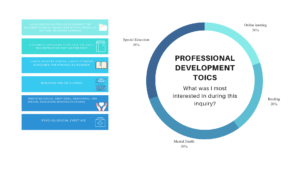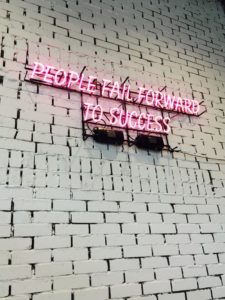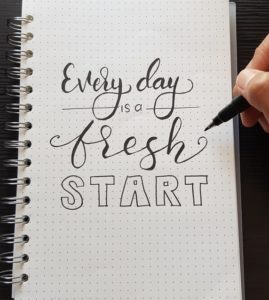 A graphic representation of the free professional development for pre-service teachers that I completed.
A graphic representation of the free professional development for pre-service teachers that I completed.When I began my inquiry project, I wanted to have a list of valuable free professional development resources for pre-service teachers. I specifically wanted to find topics we weren’t covering in our first semester courses. We have a lot to learn, and not every topic and specific situation can be covered in our classes. Hearing ideas from educators outside Canada can also be valuable, as they might have new ideas or different perspectives, although it’s important we keep in mind that what works where they are might not translate to what will work here.
One factor that motivated this was a self-assessment we completed in our 352 class, where we identified what types of students we didn’t have as much confidence teaching. As I completed my assessment, I realized I had never worked with students with mental health challenges (that I was aware of). I also had never been in a classroom setting where I worked with students with learning disabilities. I wondered: how could I support these students? Thankfully, I didn’t have to worry, because we talked about how we could differentiate our learning for different students in all of our classes!
What did I learn from this inquiry project?
Other than what I learned specifically for the inquiry, I learned about time management, self-paced learning, and myself! Everything I did for professional development was self-paced. Although it sounds like it will be less stressful, it can actually be more stressful because you have to motivate yourself intrinsically, and you control how much you work or don’t work. In the worst case scenarios, you can completely overload yourself or do nothing at all. I did both, and that’s okay. Learning takes time, so we need to be as patient with ourselves as we would be with others. All we can do is try our best!
As much as I wanted to, I wasn’t able to do everything that I planned. An example of this comes from last week, when I wanted to explore Microsoft’s Student Teacher Education Program.
Due to time constraints, however, I decided to look around edWeb more instead, and look into some of the many free webinars they offer. I’m glad I did!
I watched one webinar on how we can use portfolios in the classroom and another on teaching students with dyslexia!
I was already interested in using portfolios as a way to assess students in my future classroom, and watching the webinar helped me become a little more informed on how we can use them. Bonus: the teacher leading the webinar was from Canada! As for teaching students with dyslexia, I really didn’t know anything before I watched the webinar. I feel a little more confident that I would be able to teach dyslexic students now, although I still have a lot to learn! Being able to take a short quiz to check your understanding after watching is also a nice addition to their free service.
How can we do this in the future?
Some of the best ideas I learned were from my classmates and the excellent teachers and students at my Wednesday field experience. Professional development is not only something you can do at home, but something you will do in school. Our 780 seminar leaders mentioned how they complete inquiry projects into topics in education, so it’s safe to say that inquiry is something we will be doing in the future as teachers! This inquiry taught me that it’s okay to not know everything. It’s okay to take things at your own pace, too. When I become a teacher, I need to remember this. It’s also important to remember this process if I assign an inquiry project to students. Exploring our interests in a topic shouldn’t be stressful; it’s an opportunity to look into what we’re curious about. I’m really interested in how we can support students with reading challenges, English Language Learners, and educational technology! This course introduced me to a lot of interesting new tools, and I want to learn more about using technology in the English classroom in a meaningful way!
What I Would Recommend Someone Else
- Be realistic. You can’t learn everything, even if you’re really interested in the topic.
- Take your time! You don’t need to feel guilty for not doing what you thought you would.
- Try something new! You never know what you’ll discover.
Looking back at my inquiry, I think I’d tell myself to take it easy. Even though it doesn’t look like I used a lot of different professional development resources, some of the online courses lasted many hours. Completing one a week, on top of an already packed schedule, was difficult at times. I don’t regret my choice to pursue this topic, though, because I feel more confident. I’m excited to see what kinds of inquiries I’ll do in the future. What else will inspire me?
I hope you find many topics you’re passionate about, and that you remember to pace yourself while you do your own inquiries.
Thank you for reading and being a part of my learning journey. It’s been a long semester, but it’s been my favourite one so far.
Talk to you later!
Amber







